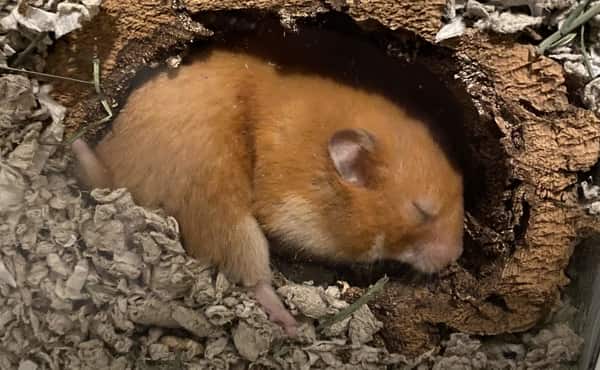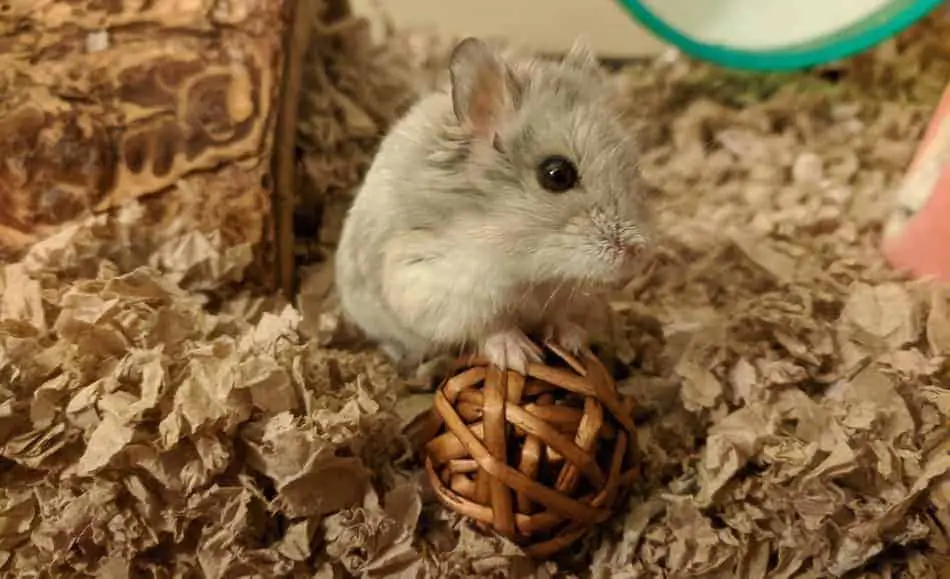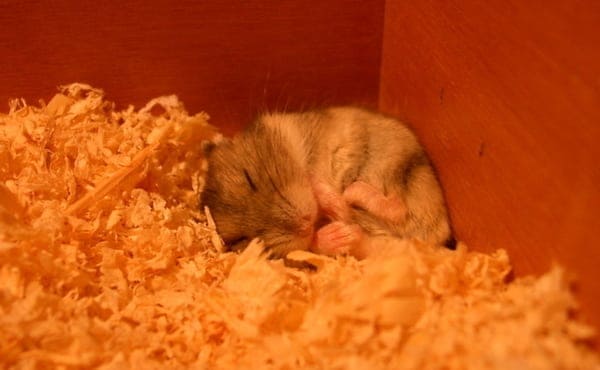There’s a continuing debate about whether hamsters are nocturnal or crepuscular (most active in the morning and evening). It’s certainly not uncommon for a hamster to be active during the morning and evening hours. Continued activity during the main portion of the day is rare, but the sleeping/waking patterns of individual hamsters can vary greatly, depending on their circumstances.
So, why is my hamster up in the morning? Morning may be near the end of your hamster’s activity period, leading it to be quite busy. Many hamsters will use this time to grab a snack, drink some water, and get a few more turns in on the wheel. Morning is a normal time for hamsters to be awake and active.
This article will give you an in-depth overview of regular hamster sleep and activity patterns before taking a look at how unusual hamster sleep patterns could indicate insecurity or illness. Finally, we’ll give a few tips on how to gently adjust your hamster’s sleep schedule so you can enjoy more time with it.
Regular Hamster Sleep Patterns
In general, hamsters need six to eight hours of sleep each day. As we mentioned before, this can vary between individual hamsters, but if your hamster sleeps noticeably more or less than this, it may feel insecure in its current environment or have a health issue.
Most of this sleep time will be during the day. However, it’s not unusual for a hamster to sleep for a few hours, then stay active for a few hours, and continue to repeat this cycle.
Morning Hamsters
Hamsters that are active for a short time in the morning, and then go to sleep, were probably also active for much of the night. This is especially likely if your hamster seems sleepy and is just sitting in its food dish nibbling a snack.
A hamster that is wide awake and running around may have a more crepuscular schedule. If your hamster regularly sleeps during the night and is active for several hours a day, it’s not necessarily something to be concerned about. Just try to be aware of its normal sleep cycle so you’ll know if it is deviating.
Light Sleepers
Some hamsters may get up in the morning because you do—especially if their cage is in a part of the house you frequent in the morning or this is when you give them food and change their water. They may have been disturbed from their sleep by the noise or movement around them. This is fine as long as your hamster gets enough uninterrupted sleep at other times of the day.
If your hamster pops out of it’s sleeping area every time you enter the room or make a little noise, you may need to restructure your schedule or move the hamster’s cage to make sure it’s not being disturbed too often. It’s also important that your hamster has some kind of hideaway—a dark, sheltered place for it to make its nest.
Variance Between Breeds
Your hamster’s sleep pattern may depend slightly on what kind of hamster it is. Syrian hamsters tend to have more rigid sleep schedules. They often sleep for solid chunks of time and emerge looking very drowsy. They’re also likely to be grumpy and prone to biting if their sleep is abruptly interrupted.
Dwarf breeds may have a less rigid sleep schedule. They sometime sleep for only a couple of hours at a time before becoming active for a couple of hours. While this is not a problem as long as your hamster’s health remains good, dwarf hamsters may be more easily roused from sleep and may not get enough sleep if they are kept in a busy or noisy area of the house.
Irregular Hamster Sleep Patterns
Irregular sleep patterns can be one of the first indicators that something is not right with your hamster, which is why it’s important to know its normal sleep schedule. If your hamster is suddenly sleeping more or less or has adopted a wildly different sleep pattern than usual, it may be time to see the vet.
You should also consider any recent changes in your hamster’s world that could be upsetting its sleep schedule.
Hamster Always Sleeps
Baby hamsters will sleep for hours at a time, but their sleep patterns should reflect those of adult hamsters by the time they’re five to twelve weeks old. An adult hamster that is sleeping for over 12 hours a day may be ill or old. Older hamsters will naturally begin to sleep longer hours.
Hamsters may also sleep longer if they are getting too cold. They have even been known to hibernate if kept in cold temperatures for an extended period of time. A hamster that seems withdrawn and sleeps continually also may be bored, ill, or depressed. To determine whether this is the case, you can look for other symptoms like the following:
- Dull, ruffled, or dirty fur
- Running eyes or nose
- Eating or drinking less than usual
- Hunched posture
- Diarrhea
- Lethargy
- Aggression
Remember that your hamster will naturally sleep most of the daylight hours. You may need to stay up late or get up early for a few days to check if your hamster is actually up, running around, and behaving normally during the night.
Hamster Never Sleeps
A hamster that seems to never sleep may also be suffering from illness or it may be finding it difficult to rest peacefully in its current situation. It’s also not unusual for a hamster to sleep less when it has recently been brought home or placed in new surroundings. It takes a while for it to get used to things and settle into a normal sleep cycle.
To help your hamster feel secure enough to sleep, provide a dark hideaway for it to nest in and keep the cage in an area of the house that is not too busy or noisy during the day.
Also make sure your hamster is not being bothered by other pets or people during its normal sleeping time. Finally, check that the room where you keep your hamster never becomes too cold or hot as this can interfere with the hamster’s sleep.
It’s also possible that a hamster that rarely seems to sleep has simply changed its schedule to more closely match yours. This is especially likely with dwarf breeds. Before assuming something is seriously wrong, try to check your hamster a couple of times during the night to see if it is catching up on sleep at the same time you are.
A final reason your hamster may not be sleeping enough could be that it is ill or suffering from psychological stress. Cage rage, a condition often brought on by a cage that is too small or dirty, overcrowding, or boredom, will often exhibit itself in odd sleep patterns, including a hamster that almost never sleeps.
Other symptoms include obsessive pacing or circling of the cage, bar chewing, and aggression.

Changing Your Hamster’s Sleep Schedule
Trying to change your hamster’s sleep schedule is not really recommended as it could be stressful for it and compromise its health. However, if your hamster is sometimes awake in the morning or during the day anyway, and you’d like to encourage this behavior, there are a few ways you can do it that won’t harm your hammie.
Give Your Hamster Incentive
First of all, you can encourage your hamster to be awake when you are around by making the time it spends with you as pleasant as possible. Depending on your hamster, this may mean interesting adventures or just lots of yummy treats. Soon your hamster will choose to be up and about with you because it enjoys your company.
Make Day Night
You can also encourage your hamster to stay up longer in the morning or earlier in the evening by tricking it into thinking that it is nighttime. You can do this by partially covering the cage or blocking out the brightest lights in the room.
Just make sure you adjust your hamster’s schedule gradually and don’t try to completely reverse its waking and sleeping hours as this could be detrimental to their health and leave you with a very grumpy pet.
Don’t Wake Them Too Often
A hamster that has been rousted from sleep will be a grumpy hamster that is likely to bite. Try to wake your hamster as infrequently as possible and do so as gently as you can. One way to gently wake your hamster is to change its food and water, spot clean the cage, or engage in some other unobtrusive activity while talking softly until your hamster emerges from its nest.
Conclusion
If your hamster is a morning hamster, it could just be his natural preference. The time that you and your hamster share when you’re both awake is rare, so enjoy it! Unless your hamster is sleeping more or less than six to eight hours a day, you shouldn’t need to worry about it being up and about in the morning.



